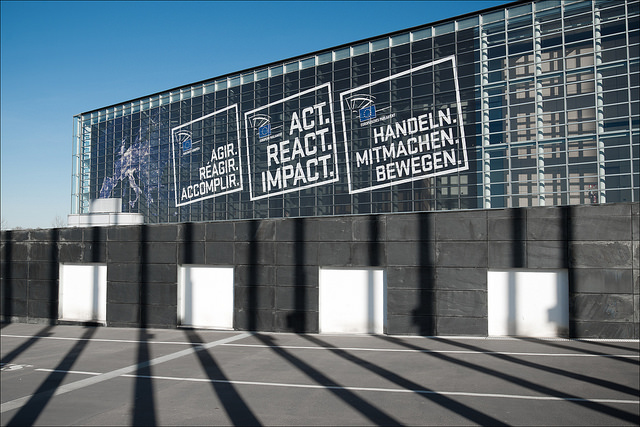
The first direct elections to the European Parliament were held in 1979, when it had very few powers. The forthcoming elections to be held in May of 2014 will be the first to have a truly European-rich content, with a Chamber with a high degree of competencies and in the midst of a Russian-Ukrainian crisis that might lead to a redefinition of the alliances that had held firm in Europe over the past few years. Although domestic issues (in Spain even regional issues in some cases) will ultimately dominate the elections, the economic crisis has led the people, in the Eurozone and beyond, to realise that the EU is important to their lives –in fact, very much so–. For the first time people are talking, even if disparagingly, of Europe and of other European countries, and not only about the economy. Some countries have even criticised others on a variety of topics: a French Minister, and even the leader of the National Front, Marine Le Pen, have criticised Spain’s abortion-law reform. Mutual interference is now a part of present-day Europe.
The elections concern 507 million citizens of 28 EU member states, of which around 380 million are entitled to vote, in one of the world’s biggest democratic exercises (second only to India). With the crisis, Europe’s citizens have realized how important the Union is but have a poor opinion of its institutions, although they have an even poorer opinion of their own governments. Spain is no exception. However, even though confidence in European and national institutions continues to be on the decline (despite mistrust in the former having stabilised), Spanish support for the euro seems to have recovered somewhat according to the latest Eurobarometer survey. In the autumn of 2012 it was at 62%, in the spring of 2013 at 52% and in the autumn of 2013 at 56%. Although not overly enthusiastic, a clear majority of Spaniards still understand that if inside the Monetary Union it feels cold, if Spain were outside it would be freezing.
Spain is a relatively exceptional case: it has no Eurosceptic movement, particularly on the populist extreme right, although it does have a critical school of thought on the left. But along with other countries in the South of the EU it does diverge politically, which goes beyond the difference in the risk premium: in terms of political mistrust, the difference between the South and the North of the EU has increased between 2002 and 2012 from 9% to 32% in the case of governments and from 6% to 25% as regards political parties. The difference in the level of dissatisfaction with democracy has risen from 21% to 46%. Democratic distrust is certainly more acute in the South.
Thus, the situation is very different to the Netherlands and France, where Euroscepticism and right-populism are on the rise, and to countries outside the euro, as with Nigel Farage’s United Kingdom Independence Party (UKIP). The latter has been very clear: what is important about the European elections is not representation in the European Parliament but the influence of the election’s results in the UK, in order to withdraw from the EU and to tighten up immigration policy. This shows that despite being the most European elections to be held so far, they will still be merely an assemblage of national elections with European consequences.
The Europhobes –who call themselves ‘Euro-realists’– have forced the pro-Europeans on to the defensive. They have a cogent proposal, have managed to stimulate debate and have imbued the elections with a content that suggests that there is much at stake at the European level. The pro-Europeans, on the other hand, lack a strategy, as recently pointed out by Germany’s former Minister of Foreign Affairs Joschka Fischer. They must urgently regain a sense of where they want –we want– to go. Europe is experiencing a strategy crisis, regarding both itself and also, for instance, in relation to Russia. This is partly derived from a leadership crisis, and leadership in Europe is dependent not on a single person, but on a group of leaders. Jacques Delors was not alone, but was supported by Kohl, Mittterrand, González and even Thatcher. A mere change in the European Commission’s Presidency will not produce a strategy.
And although these will be the most European elections yet, there is no guarantee that there will be a high turnout to elect MEPs that citizens consider to be very far from their immediate interests, to which should be added the general dissatisfaction towards politics in general. The people see these elections as a subsidiary event, which encourages abstention. The turnover has declined in an inverse proportion to the powers that the European Parliament has gained Treaty after Treaty. It reached 61.99% in 1979 (in a nine-member Europe) and steadily dropped to 43% in 2009 (in a 27-member Union). It must be borne in mind that in a federal system like the US, turnover in the latest elections to Congress was around 54%, slightly below the figure for the presidential elections, but far above the mid-term elections (less than 40%).
There are no EU-wide opinion polls for May. However, according to PollWatch, some analyses carried out jointly by experts from the London School of Economics and Trinity College Dublin suggest that the Socialists and Democrats, currently the second-largest group in the European Parliament, will become the largest with 221 seats out of a total of 751, 14% above their current strength. Although the European People’s Party and the Liberals are expected to lose seats, the traditional parties will still control 70% of the chamber, so that governance problems with the radical Europhobes will be unlikely –however much noise they make–. But the results are likely to reflect a further fragmentation of the electorate, or rather, of the electorates, because they will still be national ones.


